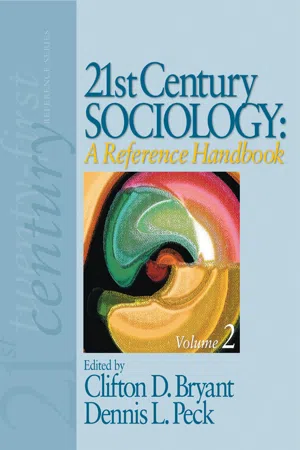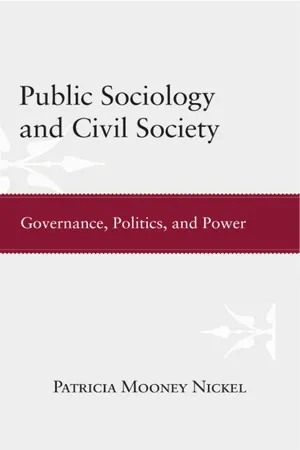Social Sciences
American Sociological Association
The American Sociological Association (ASA) is a professional organization for sociologists and individuals interested in the field of sociology. It promotes the study and understanding of society, social behavior, and social issues through research, publications, conferences, and educational programs. The ASA also provides resources and support for sociologists and promotes the application of sociological knowledge to address social challenges.
Written by Perlego with AI-assistance
Related key terms
2 Key excerpts on "American Sociological Association"
- eBook - ePub
- Clifton D. Bryant, Dennis L. Peck(Authors)
- 2006(Publication Date)
- SAGE Publications, Inc(Publisher)
The history of the American Sociological Association (ASA) and its attention to teaching show intertwined, evolving patterns. Around 1970, the association was undergoing a transformation to a larger, less-elite organization. Most disciplinary associations traditionally function as societies of knowledge producers; the well-being of the discipline generally takes precedence over its application. In the 1970s, the Executive Office functioned like a secretariat—collecting dues, offering an annual meeting, publishing several journals, and maintaining the governance system to support this work. There was little programmatic work, including sparse attention to teaching and sociological practice. Elected leaders were primarily from Ph.D.-granting institutions.Shifts in ASA to become more programmatic and to have initiatives centered on teaching did not always meet with enthusiasm. As with any change in function and power, some parties push back, advocating the merits of the status quo. In their article “The Transformation of the American Sociological Association,” Simpson and Simpson (1994) describe the evolution of that association from a learned society to a professional association:Since the 1950s, the American Sociological Association (ASA) has expanded its activities beyond its original disciplinary focus. It has taken more interest in non-disciplinary activities and has expended effort and resources on them. It has become not just a body of scholar/researchers, but increasingly a professional association. (P. 259)In describing new emphases on applied or nonacademic positions and on formal ways to improve teaching and political activities, they conclude by saying the following:These actions embody cherished democratic values, but as organizational goals and actions they have blurred the disciplinary focus of the ASA. They have structurally differentiated ASA’s disciplinary functions from its professional and adaptive activities, and the different functions now compete for resources. The changes have diluted the control of the association by disciplinary elites and have channeled ASA resources into activities that do not advance the discipline. (P. 259) - eBook - ePub
Public Sociology and Civil Society
Governance, Politics, and Power
- Patricia Mooney Nickel(Author)
- 2015(Publication Date)
- Routledge(Publisher)
Knowledge does not emerge as true or false, good or bad; it circulates through what Foucault (1980) called an “ensemble of practice.” In the case of the social sciences, these ensembles of practice are embedded in disciplinary associations, such as the American Anthropological Association, the American Society of Criminology, the American Political Science Association, or the American Sociological Association. These professional institutions control the circulation of knowledge through accreditation of curricula, annual conferences representing “the state of the field,” and the publication and circulation of peer-reviewed journals, such as the American Anthropologist, American Political Science Review, Criminology, and American Sociological Review, which represent knowledge that has been sanctioned by the discipline. These regimes of knowledge/power (Foucault 1980) govern the boundaries of the discipline. The question of how public sociology will be treated by the ASA is “a question of what governs statements, and the way in which they govern each other so as to constitute a set of propositions which are scientifically acceptable…. In short, there is a problem of the regime, the politics of the scientific statement” (Foucault 1980, 112–113). If it was initially celebrated as a critical stance, public sociology was quickly absorbed into this regime. Within two years of his Presidential Address, Burawoy’s campaign for public sociology had become widely institutionalized, not only within the publishing and conference circuits, but also within the ASA and a handful of academic programs. In 2005, the “ASA Task Force on Institutionalizing Public Sociologies” was established to address the question of how public sociology would be incorporated into this regime and transformed into “official” or “legitimate” knowledge (Apple 2003)
Learn about this page
Index pages curate the most relevant extracts from our library of academic textbooks. They’ve been created using an in-house natural language model (NLM), each adding context and meaning to key research topics.

